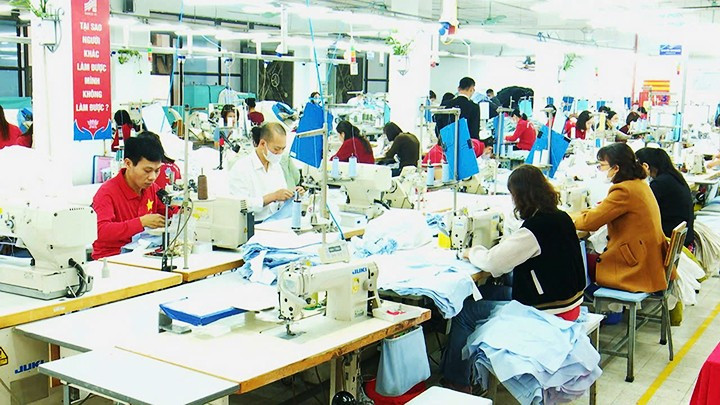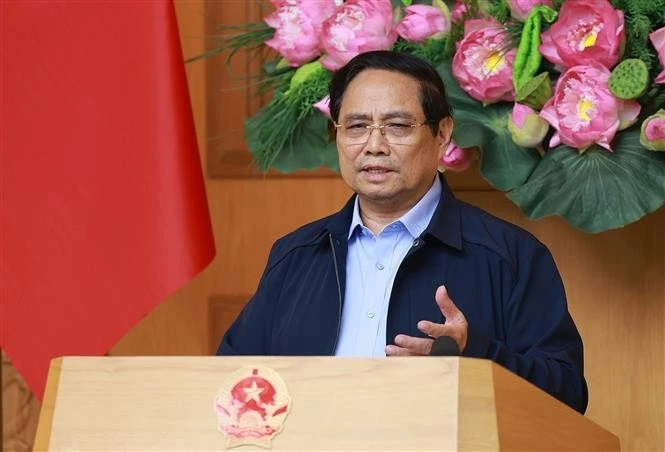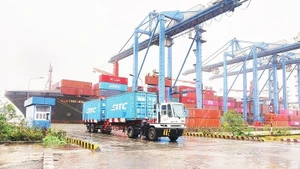Identifying key issues
The overall objective of the resolution is to continue improving the business environment by reducing compliance costs, ensuring adherence to good international practices, implementing decentralisation and delegation of authority, promoting entrepreneurial spirit, and encouraging innovation and creativity.
Additionally, there are specific targets regarding the number of newly established businesses and reducing the rate of temporarily suspended businesses.
Specifically, in 2025, the number of businesses entering the market (both newly established and resuming operations) should increase by at least 10% compared to 2024. The number of businesses withdrawing from the market should increase by less than 10% compared to 2024 (in 2024, the number of withdrawing businesses was 197,900, a 14.7% increase compared to 2023).
Commenting on these objectives, Nguyen Thi Minh Thao, Head of the Business Environment and Competitiveness Department at the Central Institute for Economic Management (CIEM), stated that the current Resolution 02 and a series of annually issued resolutions on improving the business environment that maintain continuity and development.
Accordingly, each year key issues for both short-term and long-term reforms are identified. In the past year, although most macroeconomic indicators such as GDP growth, import-export turnover, and industrial production index were positive, the number of businesses withdrawing from the market continued to increase monthly. In some months, this figure even exceeded the number of businesses entering the market.
Regarding the causes, according to Thao, besides difficulties due to changes in the global political and economic situation and internal business challenges, barriers in the business environment have not been significantly removed. There is particularly a lack of synchronisation in reforms, where solving one issue often creates complications elsewhere. Notably, not many administrative procedures can be conducted online, and the policy consultation process is sometimes perfunctory, without sufficient openness for affected parties to contribute their opinions.
Agreeing with this view, Associate Professor Dinh Trong Thinh, a lecturer at the Finance Academy, believes that 2025 will continue to be a challenging year for the domestic business community. This comes amid a global economy still facing numerous risks and challenges such as conflicts and geopolitical tensions, weakened global supply chains due to geopolitical instability, supply shortages, cooling but still high inflation, interest rate rise risks, and exchange rate fluctuations. Furthermore, the new economic policies of US President Donald Trump's administration will have a more profound impact on the global economic situation in general and many countries, including Vietnam.
Domestically, production and business conditions remain difficult. In January 2025, the industrial production index only increased slightly by 0.6% year on year, and the purchasing managers' index (PMI) remained below 50 for two consecutive months, indicating a contraction in business conditions in Vietnam's manufacturing sector. In this context, improving the business environment is considered one of the important factors to enhance foreign investment attraction as well as private investment for economic growth and development. It has also become one of the important measures helping the economy grow sustainably throughout the 2025-2030 period.
What are the success factors for reform?
The guiding principles of Resolution 02 list detailed implementation requirements. These include promptly establishing and perfecting institutions and policies to remove barriers, creating a favourable, safe, low-cost business environment to unlock non-state investment sources, especially private investment and public-private partnerships, encouraging innovation activities and more.
Notably, in addressing institutional bottlenecks, alongside typical content such as amending the legal system coherently and ensuring simplified regulations and administrative procedures to reduce compliance burdens for citizens and businesses, the resolution provides more specific directives. These include making consultation processes substantive; broadly consulting affected parties; organising public dialogues; improving the quality of legal implementation; resolving administrative procedures within deadlines without imposing additional requirements or conditions on businesses; accelerating decentralisation and delegation of authority with resource allocation and strengthened supervision and inspection; and further decentralising to agencies, units, and localities based on the principle of "local decisions, local implementation, local responsibility."
Based on annual observations, Thinh believed that the engagement of leaders will determine the success of reforms. Therefore, regular and continuous directives from the government and the prime minister will help implement reforms synchronously and smoothly, avoiding interruptions and stagnation. First and foremost, leaders must take responsibility and proactively establish measures to fully and effectively implement tasks within their authority, in accordance with the law and meeting practical requirements.
However, for issues beyond their authority, they must also recognise and propose changes to competent agencies, even to the prime minister and the National Assembly, to modify mechanisms and policies to meet changing requirements. This will make activities more streamlined and efficient, enhancing effectiveness in those areas. "This role needs to be enhanced in the context of bold changes in mechanisms, policies, and measures to help the business community achieve their goals, for optimal recovery and fastest economic development," emphasised Thinh.
According to economic expert Nguyen Dinh Cung, former Director of CIEM, the implementation of Resolution 02 this year has an unprecedented advantage: the entire political system, especially General Secretary To Lam, has emphasised that institutions are "the bottleneck of bottlenecks" as well as "the breakthrough of breakthroughs" and "the driving force and resources" for development. Therefore, laws must be changed to eliminate the "if it cannot be managed, it must be prohibited" mindset and develop legislation that both ensures management requirements and encourages creativity, liberating productive forces and unlocking all resources for development.
However, to accomplish this, the government needs to implement thorough decentralisation and delegation, allowing localities to make decisions and take responsibility. This will create competition among localities in facilitating business activities and attracting investment. For state agencies, besides external pressure through feedback from business associations, independent research organisations, and the media, the prime minister needs to provide continuous directives to create internal administrative pressure. "Then, the entire system will move towards improving the business environment, facilitating business development," emphasised Cung.
In January 2025, Vietnam had nearly 10,700 newly established businesses, down 30.3% compared to the same period last year, and 52,800 businesses registered for temporary suspension, a 20.2% increase. Overall, the number of businesses withdrawing from the market was five times higher than the number of newly established businesses.
















